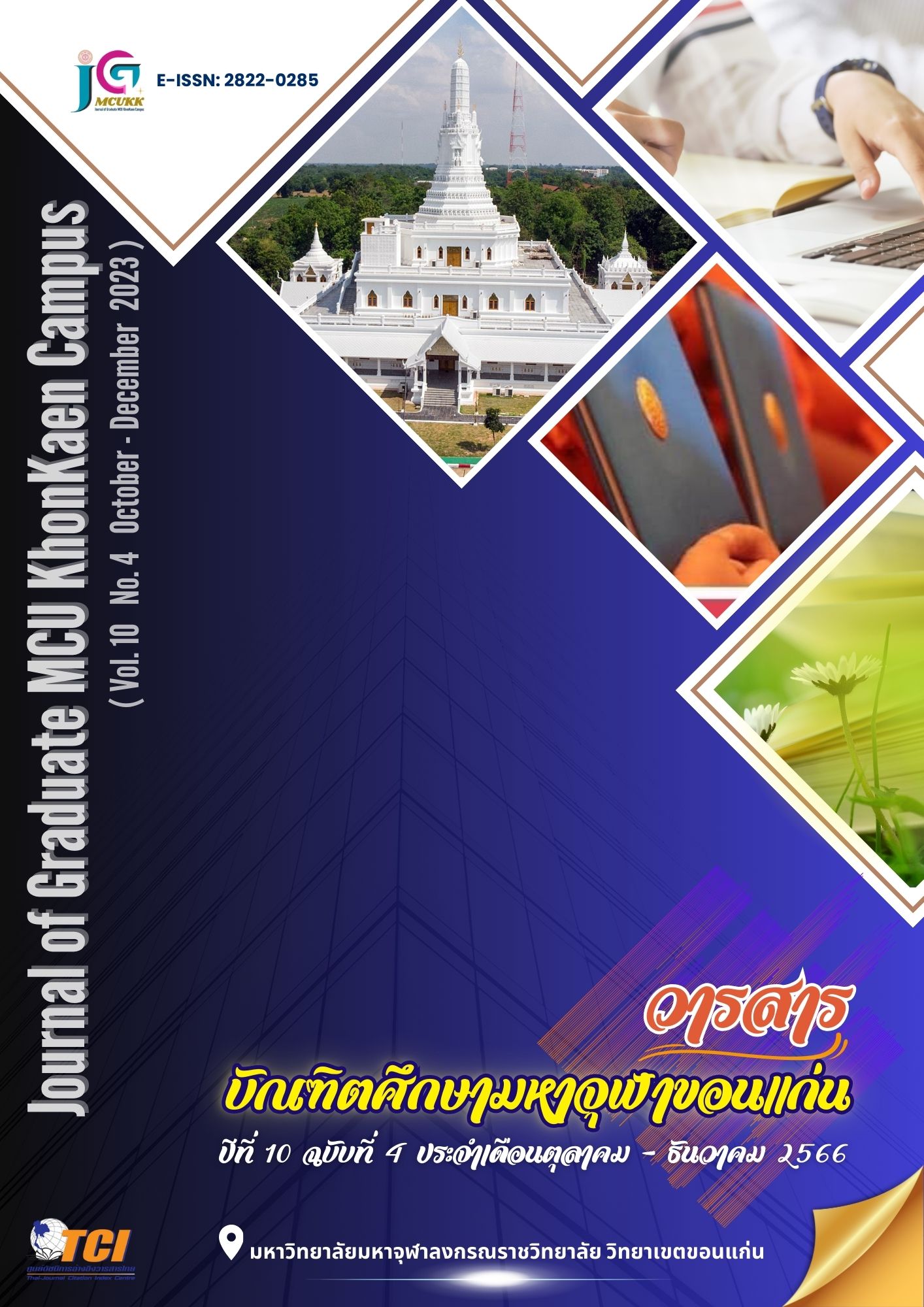การพัฒนาพฤติกรรมนักเรียนด้วยหลักพุทธจริยศาสตร์ ของนักเรียนชั้นประถมศึกษาปีที่ 5-6 โรงเรียนบ้านสองห้องฮ่องน้อย ตำบลกำพี้ อำเภอบรบือ จังหวัดมหาสารคาม
Main Article Content
บทคัดย่อ
การวิจัยนี้มีวัตถุประสงค์เพื่อ 1) ศึกษาพฤติกรรมนักเรียนประถมศึกษาชั้นปีที่ 5-6 โรงเรียนบ้านสองห้องฮ่องน้อย ตำบลกำพี้ อำเภอบรบือ จังหวัดมหาสารคาม 2) ศึกษาพุทธจริยศาสตร์ที่ใช้ในการพัฒนาพฤติกรรมนักเรียน 3) พัฒนาพฤติกรรมนักเรียนด้วยหลักพุทธจริยศาสตร์ของนักเรียนชั้นประถมศึกษาปีที่ 5-6 โรงเรียนบ้านสองห้องฮ่องน้อย ตำบลกำพี้ อำเภอบรบือ จังหวัดมหาสารคาม เป็นการวิจัยเชิงคุณภาพ เครื่องมือที่ใช้ในการวิจัย ได้แก่ แบบสัมภาษณ์เชิงลึกและแบบสังเกตพฤติกรรม ผู้ให้ข้อมูลสำคัญ ได้แก่ ผู้บริหาร จำนวน 1 คน ครูผู้สอน จำนวน 4 คน และนักเรียน จำนวน 10 คน
ผลการวิจัยพบว่า
1. พฤติกรรมนักเรียนประถมศึกษาชั้นปีที่ 5-6 โรงเรียนบ้านสองห้องฮ่องน้อย ตำบลกำพี้ อำเภอบรบือ จังหวัดมหาสารคาม ใน 4 ด้านดังนี้ 1) ความรับผิดชอบต่อการเรียน 2) ความรับผิดชอบต่อระเบียบวินัยนักเรียน 3) ความรับผิดชอบต่อสังคม 4) ความรับผิดชอบต่อสิ่งแวดล้อม
2. พุทธจริยศาสตร์ที่ใช้ในการพัฒนาพฤติกรรมนักเรียน ได้แก่ หลักกตัญญูกตเวที คือ การรู้คุณและตอบแทนคุณ อิทธิบาท 4 คือ ความรัก ความพากเพียร ความเอาใจใส่ ความไตร่ตรอง และทิศ 6
3. การพัฒนาพฤติกรรมที่ไม่พึงประสงค์ด้วยหลักพุทธจริยศาสตร์ของนักเรียนโรงเรียนบ้านสองห้องฮ่องน้อย โดยการจัดกิจกรรมคือการไว้พระสวดมนต์ปฏิบัติวิปัสสนากรรม อบรมพุทธจริยศาสตร์ในเรื่อง กตัญญูกตเวที อิทธิบาท 4 และ ทิศ 6 ทำให้พฤติกรรมนักเรียนเปลี่ยนแปลงไปในทางที่พึงประสงค์คือ 1) นักเรียนมีความรับผิดชอบต่อการเรียน 2) นักเรียนมีความรับผิดชอบต่อระเบียบวินัยนักเรียน 3) นักเรียนมีความรับผิดชอบต่อสังคม 4) นักเรียนมีความรับผิดชอบต่อสิ่งแวดล้อม
Article Details

อนุญาตภายใต้เงื่อนไข Creative Commons Attribution-NonCommercial-NoDerivatives 4.0 International License.
เอกสารอ้างอิง
กรมวิชาการ กระทรวงศึกษาธิการ. (2545). พระราชบัญญัติการศึกษาแห่งชาติพุทธศักราช 2545 และแก้ไขเพิ่มเติม (ฉบับที่ 2) พ.ศ.2545. กรุงเทพฯ: คุรุสภาลาดพร้าว.
การศึกษาในประเทศไทย. (2566). วิกิพีเดีย สารานุกรมเสรี. สืบค้นเมื่อวันที่ 10 มิถุนายน 2566. https://th.wikipedia.org/wiki/
จำเริญรัตน์ เจือจันทร์. (2548). จริยศาสตร์ : ทฤษฎีจริยธรรมสำหรับนะกบริหารการศึกษา. กรุงเทพฯ: โอ.เอส.พริ้นติ้ง เฮ้าส์.
พัทยา คงยุทธ์, (2548), การศึกษารายกรณีของนักเรียนที่มีพฤติกรรมไม่เหมาะสมชั้นมัธยมศึกษาปีที่ 5 โรงเรียนรัษฎา อำเภอรัษฎา จังหวัดตรัง. (วิทยานิพนธ์ศึกษาศาสตรมหาบัณฑิต). กรุงเทพฯ: มหาวิทยาลัยศรีนครินทรวิโรฒ.
สำนักงานการศึกษาขั้นพื้นฐานกระทรวงศึกษาธิการ. (2565). รายงานการประเมินตนเองของสถานศึกษา ระดับการศึกษาขั้นพื้นฐาน โรงเรียนบ้านสองห้องฮ่องน้อยปีการศึกษา 2565. สำนักงานเขตพื้นที่การศึกษาประถมศึกษามหาสารคาม เขต 1.
บรรชร กล้าหาญ. (2548). การบรูณาการเสริมสร้างคณธรรมด้วยกิจกรรมบัตรคุณธรรมและระบบคู่สัญญา. (รายงานการวิจัย). เชียงใหม่: วิทยาลัยเกษตรและเทคโนโลยีเชียงใหม่.
วีณา ประชากูล. (2549). การพัฒนาพฤติกรรมเชิงจริยธรรมด้านความมีวินัยของนักเรียนระดับประถมศึกษา. (รายงานการวิจัย). ศูนย์วิจัยและพัฒนาแผ่นดินเชิงคุณธรรม.
Hildreth, Gertrude H. (1966), Introduction to the Gifted, New York : Mcgraw-hill Book Co.

